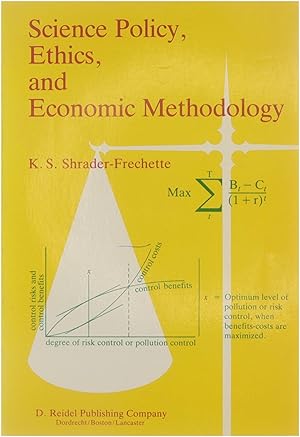distributed in the usa and canada by kluwer boston (2 Ergebnisse)
Produktart
- Alle Produktarten
- Bücher (2)
- Magazine & Zeitschriften
- Comics
- Noten
- Kunst, Grafik & Poster
- Fotografien
- Karten
-
Manuskripte &
Papierantiquitäten
Zustand
- Alle
- Neu
- Antiquarisch/Gebraucht
Einband
- alle Einbände
- Hardcover
- Softcover
Weitere Eigenschaften
- Erstausgabe
- Signiert
- Schutzumschlag
- Angebotsfoto
- Kein Print-on-Demand
Land des Verkäufers
Verkäuferbewertung
-
Science policy, ethics, and economic methodology : some problems of technology assessment and environmental-impact analysis
Verlag: Dordrecht Boston : D Reidel Pub Co Hingham MA : Sold and distributed in the USA and Canada by Kluwer Academic Publishers, 1985
ISBN 10: 9027718067ISBN 13: 9789027718068
Anbieter: Untje.com, Roeselare, Belgien
Buch
Paperback. Zustand: Good. xviii, 321 pages ; 24 cm I. Introduction.- One: An Overview of Technology Assessment and Environmental-Impact Analysis.- 1. Introduction.- 2. The Concepts of Technology Assessment and Environmental-Impact Analysis.- 2.1. TA and EIA: Similarities and Differences.- 2.2. The Components of TA and EIA.- 2.3. The Uses and Users of TA's and EIA's.- 3. The Institutionalization of TA and EIA.- 3.1. The National Environmental Policy ACT (NEPA).- 3.2. The US Office of Technology Assessment (OTA).- 3.3. TA/EIA Outside the OTA.- 4. TA/EIA Methodology.- 5. The Preeminence of Risk-Cost-Benefit Analysis in TA/EIA.- 5.1. The Origins of RCBA.- 5.2. The Techniques of RCBA.- 6. The Role of the Philosopher in TA and EIA.- 6.1. The Role of the Ethicist in TA and EIA.- 6.2. The Role of the Applied Philosopher of Science.- 7. Criticism of TA/EIA and an Outline for Reform.- Notes.- Two: Assessing Risk-Cost-Benefit Analysis, the Preeminent Method of Technology Assessment and Environmental-Impact Analysis.- 1. Introduction.- 2. The Deficiency Argument.- 2.1. Phenomenological Variants of the Deficiency Argument.- 2.2. Kantian Variants of the Deficiency Argument.- 3. Assumptions Underlying the Main Inference of the Deficiency Argument.- 3.1. The Assumption that RCBA Deficiencies Are a Sufficient Condition for Rejecting It.- 3.2. The Assumption That Any Systematic, Rational Form of Policymaking Ought to Be Rejected.- 3.3. The Assumption That Not all Policy Alternatives Have Theoretical Residuals.- 3.4. The Assumption That Wholly Rational Decisionmaking Is Possible.- 3.5. The Assumption That Many of the Constraints on Real-World Decisionmaking May Be Ignored.- 4. The First Premise of the Kantian Argument: RCBA Is Utilitarian.- 5. Conclusion.- Notes.- II. General Methodological Problems.- Three: The Retreat from Ethical Analysis.- 1. Introduction.- 2. The Principle of Complete Neutrality.- 2.1. One Case Against Complete Neutrality: Constitutive Values.- 2.2. Another Case Against Neutrality: Contextual Values.- 2.3. The Fact-Value Dichotomy.- 3. The Impossibility of Wholly Objective Technology Assessment and Environmental-Impact Analyses.- 3.1. Methodological Assumptions in Technology Assessment.- 3.2. Evaluative Assumptions in the Light of Inadequate Data.- 3.3. Political Assumptions in TA and EIA.- 4. The Ideal of Complete Neutrality.- 4.1. The Presupposition That Objectivity = Neutrality.- 4.2. The Presupposition That There Is No Place for Philosophical Evaluation in Technology Assessment and Environmental-Impact Analysis.- 4.3. Consequences of Condemning Applied Ethics and Philosophy of Science.- 4.3.1. Sanctioning Ethical Relativism.- 4.3.2. Accepting the Status Quo.- 4.3.3. Masking Central Evaluational Assumptions.- 5. Deemphasizing Nontechnical Policy Solutions.- 6. Alternatives to the Principle and the Ideal of Complete Neutrality.- 6.1. The Importance of Including Philosophical Analysis.- 6.2. The Positivistic Attack on Philosophy.- 7. Conclusion.- Notes.- Four: The Fallacy of Unfinished Business.- 1. Introduction.- 2. Suboptimization and the Status Quo.- 3. The Fallacy of Unifinished Business and the Naturalistic Fallacy.- 4. One Solution: Broadening the Scope of TA and EIA.- 5. Objections to Broadening the Scope of TA and EIA So As to Avoid the Fallacy of Unfinished Business.- 6. Conclusion.- Notes.- III. Particular Methodological Problems.- Five: RCBA and the Aggregation Assumption.- 1. Introduction.- 2. The Aggregation Assumption.- 3. Methodological Presuppositions Implicit in the Aggregation Assumption.- 3.1. The Aggregation Assumption and the First Presupposition.- 3.2. The Aggregation Assumption and the Second Presupposition.- 3.3. The Aggregation Assumption and the Third Presupposition.- 4. Theoretical Status of the Aggregation Assumption.- 5. Applications of the Aggregation Assumption to Technology Assessment and Environmental Analysis.- 5.1. Consequences of Ignoring Distributive Impacts.- 5.2. Consequences of Using Subjective Feelings as Criteria.- 5.3. Consequences of Assuming That the Individual Can Best Judge His Welfare.- 5.4. Consequences of Accepting the Market System.- 6. Future Directions and the Aggregation Assumption.- 7. Summary and Conclusions.- Notes.- Six: RCBA and the Assumption of Partial Quantification.- 1. Introduction.- 2. The Problem of Quantification.- 3. Arguments Against the Assumption of Partial Quantification.- 3.1. The Argument from Objectivity.- 3.2. The Argument from Misuse.- 3.3. The Argument from Alternatives.- 3.4. The Argument from Simplicity.- 3.5. The Argument from Politics.- 3.6. The Argument from Horse and Rabbit Stew.- 3.7. The Argument from Dehumanization.- 3.8. The Argument from Arbitrariness.- 4. Arguments in Favor of Complete Quantification.- 4.1. The Argument from Uniformity.- 4.2. The Argument from Utility.- 4.3. The Argument from Democracy.- 4.4. The Argument from Intuition.- 4.5. The Argument from Gresham's Law.- 4.6. The Argument from Clarity.- 4.7. The Argument from Heuristic Power.- 4.8. The Argument from Circularity.- 4.9. The Argument from Realism.- 5. The Consequences of Partial Quantification in Actual RCBA's.- 6. Conclusion.- Notes.- Seven: The Problem of Regional Equity.- 1. Introduction.- 2. Methodological Problems with Analysis of Distributive Impacts.- 3. Problems with Geographical Distribution of Impacts.- 3.1. The Dilemma of Federalism.- 3.1.1. Federal Supremacy and the War Power.- 3.1.2. Federal Supremacy and Preemption.- 3.1.3. Federal Supremacy and the Interstate Commerce Clause.- 3.1.4. Federal Supremacy and the Law of Eminent Domain.- 3.2. The Ethics of Equality.- 3.2.1. The Principle of Political Equality.- 3.2.1.1. Equality or Sameness of Treatment?.- 3.2.1.2. Equality of Treatment or Equality of Respect?.- 3.2.2. The Principle of Prima-Facie Political Equality.- 3.3. Relevant Bases for Justifying Inequality of Treatment.- 3.3.1. Does Inequality Serve Long-Term Equality?.- 3.3.2. Morally Relevant Reasons Do Not Support Geographical Disc.
-
Differential geometry and mathematical physics : lectures given at the meetings of the Belgian Contact Group on Differential Geometry held at Liège, May 2-3, 1980 and at Leuven, February 6-8, 1981
Verlag: Dordrecht, Holland ; Boston, U.S.A. : D. Reidel Pub. Co. ; Hingham, MA : Sold and distributed in the U.S.A. and Canada by Kluwer Boston, 1983
Anbieter: PRISCA, Paris, Frankreich
Couverture souple. Zustand: Très bon. in-4° broché, couverture imprimée d'origine, 188 pages. Collection "Mathematical physics studies", volume 3.



